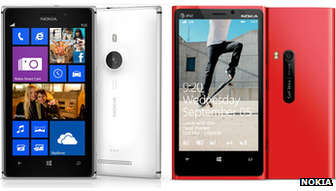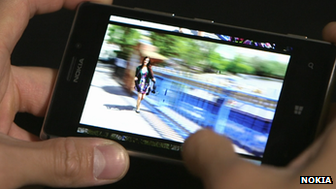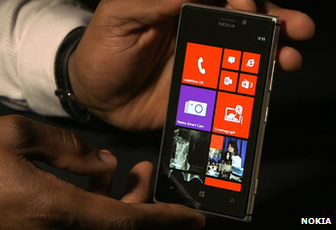Nokia Lumia 925 slims down its flagship Windows Phone
- Published
Rory Cellan-Jones talks to Nokia's chief product designer Stefan Pannenbecker about the Lumia 925
Nokia has announced a revamped version of its flagship smartphone, ditching built-in support for wireless charging.
The Lumia 925 - unveiled in London - is lighter as a result, addressing a common complaint about the Lumia 920.
The firm has also upgraded the device's camera, saying this is the first time such a complex technology has been put in a handset.
The launch comes a week after several investors criticised Nokia's strategy at its annual general meeting.
Some suggested the decision to offer the Windows Phone operating system only on its top-end phones had put it at a disadvantage against rivals whose bestselling models are powered by Android.
However, chief executive Stephen Elop said the decision to focus on Microsoft's software gave his firm the best opportunity to "compete with competitors like Samsung".
The firm said the new model would initially go on sale in Europe and China in June, followed by the US and other markets.
'More comfortable'
Nokia describes the Lumia 925 as a "new interpretation" of its predecessor, which remains on sale.
It weighs 139g (0.31lb), making it 46g lighter than the Lumia 920 - and at 8.5mm (0.33in) thick is 2.2mm thinner than the earlier model.
Its Snapdragon S4 processor and 2,000 mAh battery remain the same but the 925 has half the amount of internal storage at 16 gigabytes. A 32GB version is, however, planned as an "exclusive" for Vodafone.
"[The earlier 920] was really about building the most innovative smartphone and putting a lot of features and functionality into it," explained product design chief Stefan Pannenbecker.
"Here we left small things out in order to create a smaller product - for example wireless charging, which you can still have by adding on a cover.

The Lumia 925 (left) does not come in the same range of bright colours offered with the earlier Lumia 920 (right)
"We have created a product that is a little bit more compact and a little bit more comfortable in the hand."
The size of the Lumia 925's screen is unchanged at 4.5in (11.4cm), however the new AMOLED (active-matrix organic light-emitting diode) display is slightly higher resolution than the Lumia 920's IPS-based (in-plane switching technology) equivalent.
A more obvious cosmetic change is the addition of a metal frame and the limited choice of white, grey or black designs rather than the brightly coloured unibody plastic options offered for the older device.
"It's a little more sober and it wouldn't be too much of a stretch to think Nokia's going after more of a corporate audience," said Carolina Milanesi, consumer devices analyst at tech consultancy Gartner.
Imaging software
While the Lumia 925's main camera offers the same 8.7 megapixel resolution and "floating lens" image-stabilising technology as before, there is one change.
The optical system features a six-element lens - six layers through which the light passes before reaching the image sensor, each helping to correct image distortion.
Until now, high-end smartphone cameras have at most featured four or five such parts.
"Each element bends the light in a slightly different manner," Juha Alakarhu, Nokia's head of imaging technology told the BBC.
"The direct consumer benefit is that you get sharper images."
He added that a software update - which will also be provided to other Lumia Windows Phone 8 handsets - provided other benefits.

Motion Focus creates an effect usually achieved by panning the camera in time with the subject's movement
"The maximum ISO goes from 800 to 3,200 which means we can offer brighter images in low light conditions while controlling the noise," he said. "We have also significantly improved our colour and exposure algorithms."
The revisions may address criticisms by some reviewers that the Lumia 920's images could look "washed out", external and "very soft", external when compared with those taken on the HTC One, Samsung Galaxy S4 and iPhone 5.
A new app, named Nokia Smart Cam, also adds more gimmicky shooting modes including Motion Focus which blurs the background while keeping the foreground subject sharp, conveying a sense of action.
However, the Lumia 925 lacks one feature which was added to another model - the Lumia 928 - unveiled in the US last week: a Xenon flash.
Instead it uses less powerful LED technology to help freeze motion.
Windows Phone promise
According to market research firm IDC, external, shipments of Nokia smartphones fell from 11.9 million devices in the first three months of 2012 to 6.4 million units during the January-to-March period in 2013 - a 46% drop.
The data indicates that Nokia's market share dropped to 3% as a result while Samsung, LG, Huawei and ZTE all saw theirs grow.
Such data has put pressure on the Finnish firm's leadership.

Nokia has indicated that the Lumia 925 and other launches should help the product line improve sales
"Please switch to another road," urged one investor at last week's annual general meeting in Helsinki.
Despite Microsoft's efforts, demand for the Windows Phone lags far behind that for Google's Android and some analysts have suggested Nokia jump ship. However, IDC suggests that would be premature.
"Nokia is starting to see the first positive results," said Francisco Jeronimo, the IDC's research director for European mobile devices.
"They recently forecast about 30% growth for their Lumia, external [Windows Phone] handsets for the second quarter - if they keep growing at the same rate they will be progressing well.
"At this point it's too early to invest in Android and start again from scratch, but in six months' time if shipments aren't growing they may need to rethink the strategy."
- Published24 April 2013
- Published18 April 2013
- Published5 September 2012